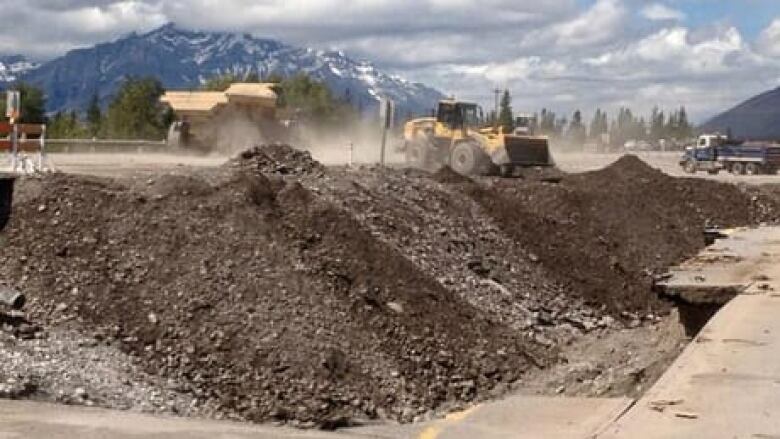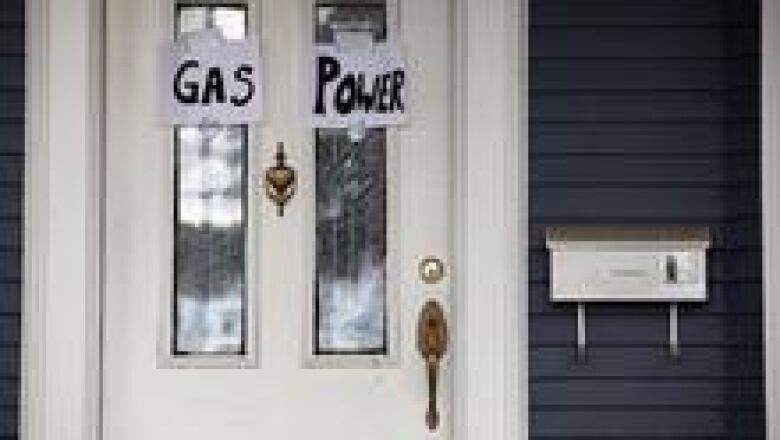Trans-Canada Highway to Banff, Canmore reopens 2 lanes
Speed limit set at 60 km/h as flood damage repair continues

Two lanes of the Trans-Canada Highway have opened west of Calgary after flooding destroyed part of the roadway near Canmore last week.
"While this is the first step, we are in it for the long haul," said Alberta Transportation Minister Ric McIver.
He said there remains a number of challenges in rebuilding highways, homes and communities throughout southern Alberta.
Officials are warning drivers that the highway is still not in top condition and the speed limit has been lowered to 60 km/h.
Elderly woman drowned in her home
A Calgary woman who was found dead her home in an evacuation zone died of drowning, an autopsy has confirmed.
The 83-year-old woman was found by friends in her Erlton home Sunday. They had returned to check on her at her ground level residence.
- Calgary floods: What you need to know now
- Health threats linger from Alberta flooding
- PHOTOS: The Calgary Zoo after the flood
She had been contacted by police in person last Thursday about the mandatory evacuation, and all indications are that the woman was going to comply with the order.
"Certainly this is tragedy for the family, for the friends, for the neighbours of the woman who passed away," said Calgary Mayor Naheed Nenshi at a press briefing Wednesday afternoon.
It was also announced Wednesday that the state of emergency in Calgary would be extended for eight more days, bringing the total of 21.
"What that means is that we continue to have the ability to respond quickly, and flexibly," said Nenshi.
A state of emergency means that a municipality can circumvent bylaws, implement lane reversals on roads and spend money without pre-approval by council.
The provincial act also gives the city power to conscript resources as needed.
When explaining what that means, Nenshi used the example of a fence that needs reinforcing.
"We can go to the Home Depot and steal their fence, and use it without asking," said Nenshi.
Power updates
Enmax CEO Gianna Manes said Wednesday afternoon that Mission, Cliff Bungalow, Beltline and Victoria Park are all expected to have power restored by 10 p.m. MT.
"Certain buildings in this area may still have water in the basement and those individual buildings will not be able to have power to them until the building is dry," said Manes.
In the downtown core, five out of seven power zones had been re-energized, though only 30 per cent of buildings are ready to have power restored.
Across the city, there are still at least 11,000 people out of their homes, down from 100,000 at the peak of the crisis.
Water tables a stumbling block
"We’re starting to see the water tables start to drop, which stops the continued infiltration, where as soon as you pump something up it fills back up," said Bruce Burrell, Calgary Emergency Management Agency director.
But Burrell warned that progress is likely to slow down. He compared progress to sponges, where work done up to now was like squeezing out a damp sponge and work being done now is like dealing with a sopping wet sponge.
McLeod Trail, a major Calgary road leading into downtown, was reopened at 6:30 a.m. MT, but Memorial Drive and all bridges over Elbow River remain closed, said Burrell.
Eighty per cent of roads have been reopened across the city, said Burrell on Wednesday morning.
The Bow is still flowing at three times its normal rate, double the rate in 2005, said Nenshi.
Towing in flood-affected areas
The city will start towing vehicles that are blocking access for flood-support equipment in affected areas.
- LIVE: Updates from reporters, emergency officials on Alberta flooding
- Calgary mayor urges limited travel downtown
- Alberta flood cleanup volunteers told to protect their health
"It’s a courtesy towing service, meaning you’re not going to pay for it, but your car might not be exactly where you left it," said Burrell. "We’ll pull it around the corner, find a close little spot to near where it was left."
If you can’t find your car, call the Calgary Parking Authority Dispatch Line at 403-537-7100.
Community Support Centres
The city is implementing a new way for flood-affected residents to access city services.

Previously, people had been told to put a sign in their window or make a 311 request if they needed to have power restored or water pumped out of their home.
Now the city is asking people to stop putting signs in their windows, and instead to access one of nine Community Support Centres that were set up Wednesday morning. Requests through the 311 phone line or app will still be processed, but Burrell suggested that the centres would be more responsive because they are in the communities where requests originate.
The centres will have representatives from Calgary police, fire, water resources, waste and recycling, development and building approvals and ATCO for utility and energy needs.
They have been set up in communities most ravaged by the floods and will be open from 9 a.m. to 10 p.m. MT, said Burrell.
Sewage in the Bow River
The flooding has forced the city to dump raw sewage into the Bow River.
The Bonnybrook Wastewater Treatment Plant was inundated with floodwater, say city officials.
Mayor Naheed Nenshi said the city's other two plants are still operating, but municipalities downstream have been warned about the problems at Bonnybrook.
"There is some sewage discharge into the river, which is not uncommon in conditions like this, and the important thing is the folks downstream know how to deal with it, just as we're dealing with it when it comes to us from upstream."
The city says the Bonnybrook plant is not meeting provincial standards right now, and it's working with Alberta Environment on the problem.
Nenshi said the city’s two other plants are operating safely and communities downstream have been warned about the problem.
Huge volunteer response
"If you want to volunteer, go volunteer. Go to a flood-affected area," said Nenshi.
He said the support of neighbours and Calgarians for each other has been amazing.
"Literally people just going door to door and saying ‘What can I do for you?’"
If you are going to help out, take transit, bike or park outside the neighborhood and walk in, he said.
Nenshi warned people against going to flooded communities just to take photos and survey the damage.
"Don’t be a lookie-loo. I f you’re just there for sightseeing, get out of the way," said Nenshi. "You can see lots of pictures on the internet."